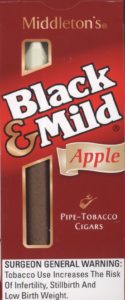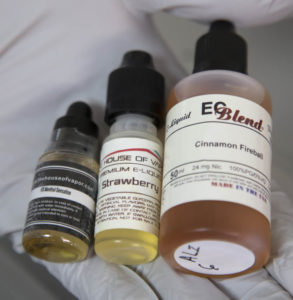Flavors increasingly drive the use of emerging tobacco products.
Effective regulation of these products requires comprehensive examination of flavors and flavorings, for which the toxicological, health, and behavioral implications are poorly understood. Emerging tobacco products (cigarillos, waterpipe, electronic nicotine delivery systems (ENDS)) are overwhelmingly flavored and represent a significant and increasing proportion of tobacco consumption in the US.
Many tobacco flavoring ingredients labeled ‘Generally Recognized as Safe (GRAS)’ were intended for foods but have not been evaluated for inhalation toxicity.
 Flavors appear to play an important role in attracting users to these emerging tobacco products. FDA’s scope of regulatory authority allows it to address flavored tobacco products in a number of ways, ranging from packaging and labeling rules, to restricting the use of specific flavorings via product standards, and as far as banning characterizing flavors in tobacco products. Data are needed to understand consumer perceptions and use of flavored tobacco products, as well as the toxicity and health effects of such products.
Flavors appear to play an important role in attracting users to these emerging tobacco products. FDA’s scope of regulatory authority allows it to address flavored tobacco products in a number of ways, ranging from packaging and labeling rules, to restricting the use of specific flavorings via product standards, and as far as banning characterizing flavors in tobacco products. Data are needed to understand consumer perceptions and use of flavored tobacco products, as well as the toxicity and health effects of such products.
We propose a Western New York-based Center for Research on Flavored Tobacco Products (CRoFT) to integrate these domains. The goal of this TCORS is to develop a scientific framework for evaluating the potential effects of flavors on tobacco product users in the specific domains of Toxicity, Health Effects, Behavior, and Communication. 
Our research teams combine recognized tobacco regulatory science, biobehavioral, and communications research expertise with top-notch inhalation toxicology and exposure science expertise, drawing on available resources such as Clinical and Translational Science Institutes (CTSI), regulatory science programs, leading education and training curricula, and extensive mentoring opportunities. This is drawn together by a common interest in the impact of flavors in tobacco on health of individuals and the population as a whole.
We propose a novel framework and approaches for assessing the impact of tobacco product flavors and flavorings on consumer behavior, exposures, and health. Overall, the projects will generate findings to inform regulatory science in four areas of relevance to FDA: Toxicity, Behavior, Health Effects, and Communications.
Specific Aims for CRoFT:
- Apply state-of-the art methods to assess the chronic toxicity of specific flavorings used in tobacco products using chemical reactivity, in vitro models, and in vivo research studies.
- Apply consumer sensory and behavioral laboratory approaches to examine the behavioral impacts of flavors, including sensory thresholds for single and combinations of flavorings, and the impact of flavoring concentration on use patterns (topography, inhalation).
- Apply longitudinal cohort and product-switching designs to examine the chronic respiratory health effects of flavorings in tobacco products among current users.
- Apply qualitative, quantitative, and experimental approaches to examine the effects of information on flavor choice and flavored product use.
- Develop a framework for integrative data analysis that combines information from multiple streams (toxicity, behavior, health effects, communication, product chemistry, biomarkers) to arrive at an overall assessment of flavor risk profile.
The four projects (Toxicity, Behavior, Health Effects, and Communications) are supported by three center-named cores:
and two required cores (Administrative and Career Enhancement) to provide supportive data and linkages among the projects.
We propose using ENDS as products around which to frame this research, given these are the most commonly used flavored product, with the vision that the research framework could be broadly generalizable to other flavored tobacco products. The focus on flavor will position this U54 to address a topic that is robust across product types, to be responsive to rapid response projects, and to be nimble in expanding the methodologies to new products that may emerge over the life of the grant. In developing CRoFT we considered multiple possible approaches and believe that the proposed comprehensive suite of studies best addresses FDA’s regulatory science needs by focusing on a critical attribute that is amenable to regulation and applicable across different tobacco product classes.



